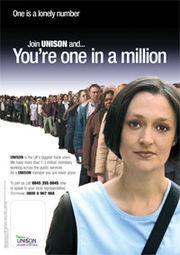
UNISON
Encyclopedia
UNISON is the largest trade union in the United Kingdom
United Kingdom
The United Kingdom of Great Britain and Northern IrelandIn the United Kingdom and Dependencies, other languages have been officially recognised as legitimate autochthonous languages under the European Charter for Regional or Minority Languages...
with over 1.3 million members.
The union was formed in 1993 when three public sector trade unions, the National and Local Government Officers Association
National Association of Local Government Officers
The National and Local Government Officers Association was a British trade union representing mostly local government "white collar" workers. It was formed in 1905 as the National Association of Local Government Officers, and changed its full name in 1952 while retaining its widely-used acronym,...
(NALGO), the National Union of Public Employees
National Union of Public Employees
The National Union of Public Employees was a British trade union which represented public sector workers. The union was founded in 1908 as the National Union of Corporation Workers, which split from the Municipal Employees Association, following Albin Taylor's dismissal as General Secretary...
(NUPE) and the Confederation of Health Service Employees
Confederation of Health Service Employees
The Confederation of Health Service Employees was a United Kingdom trade union representing workers primarily in the National Health Service...
(COHSE) merged.
UNISON's current general secretary is Dave Prentis
Dave Prentis
Dave Prentis is the current General Secretary of UNISON, the United Kingdom's largest trade union. He was originally elected on 1 January 2001 and was re-elected in March 2005, with 77% of the vote.-Early life:...
. He was elected on 28 February 2000 and took up the post on 1 January 2001, succeeding Rodney Bickerstaffe
Rodney Bickerstaffe
Rodney Bickerstaffe has been president of the UK National Pensioners Convention and was leader of Britain's largest trade union, UNISON until 2001....
who had held the post for five years.
Members and organisation
Members of UNISON are typically from industries within the public sector and generally cover both full-time and part-time support and administrative staff. The majority of people joining UNISON would be workers within areas such as local government, education, the National Health ServiceNational Health Service
The National Health Service is the shared name of three of the four publicly funded healthcare systems in the United Kingdom. They provide a comprehensive range of health services, the vast majority of which are free at the point of use to residents of the United Kingdom...
, police services, utilities (such as gas, electricity and water), and transport. These 'Service Groups' all have their own national and regional democratic structures within UNISON's constitution.
As a trade union, UNISON provides support to members on work related issues, including protection and representation at work, help with pay and conditions of service and legal advice. Each company or organisation will usually be represented by a particular UNISON branch and members within that organisation elect volunteer stewards to represent them. The stewards receive training in workplace issues and are then able to co-ordinate and represent members both on an individual basis and collectively.
Each branch is run by an annually elected committee of members which holds regular meetings, including an annual general meeting for all members to attend. Branches elect delegates to the union's annual National Delegate Conference (held in June every year), the supreme body within the union's constitution with responsibility for setting the union's policies for the forthcoming year.
To encourage all voices to be heard UNISON has "self organised groups" of black and minority ethnic members, women members, lesbian, gay, bisexual & transgender members, and disabled members. Young members and retired members also have their own sections within the union.
Membership fees
The levels of subscription are determined by the National Delegate Conference and are recorded as a Schedule in the union rules. The National Delegate Conference has the power to vary the subscriptions levied after a majority vote, although the subscription rates do not change frequently.Local branches may also, after a majority vote of members, impose an additional 'Local Levy' as long as the levy does not exceed one sixth of the subscription payable. This is in addition to the standard rate, and must be used for local branch purposes.
Membership fees vary depending on how frequently members are paid and the level of their current salary (see table). Subscriptions are generally paid by what is commonly known as "check-off" or DOCAS (Deduction of Contributions at Source). This is where the employer deducts the contribution from the employee's salary on behalf of the union. Payment is taken by Direct Debit if the member joins online, if the member specifically requests it, or if there is no DOCAS arrangement with the employer.
Student members in full-time education (including student nurses or Modern Apprentices) have a fixed rate subscription of £10 per year.
Members who have had continuous membership for at least two years may opt to pay a one-off fee of £15 upon retirement from paid employment. This allows them to retain the benefits of being a union member for life. They are then classed as 'Retired Members'.
Members who are dismissed or made redundant from employment may retain their membership for £4 per year for a period of up to two years whilst they remain unemployed.
Membership campaigns

The national organisation also engages in publicity such as the "Ants and Bear", which was used at the formation of the new amalgamated union. This advertising campaign showed an ant trying to get past a large bear by shouting "Excuse Me", however the bear did not pay attention. The next scene showed the ant being joined by many thousands more, and them all saying "Get out of the way!" together, which does get the bear's attention and makes him move out of the way.

Political work

Labour Party (UK)
The Labour Party is a centre-left democratic socialist party in the United Kingdom. It surpassed the Liberal Party in general elections during the early 1920s, forming minority governments under Ramsay MacDonald in 1924 and 1929-1931. The party was in a wartime coalition from 1940 to 1945, after...
, a non-affiliated General Political Fund or to opt out of contributing to a political fund at all. UNISON also carries out research and campaigns on public service issues, such as the Private Finance Initiative
Private Finance Initiative
The private finance initiative is a way of creating "public–private partnerships" by funding public infrastructure projects with private capital...
(PFI). It has also voted (at its 2005 annual conference) to oppose the Government's proposals for a British national identity card
British national identity card
The Identity Cards Act 2006 was an Act of the Parliament of the United Kingdom. It provided for National Identity Cards, a personal identification document and European Union travel document, linked to a database known as the National Identity Register .The introduction of the scheme was much...
.
The union's links to Labour and its moderate policies has caused some conflict and criticism of action taken against left-wing activists.
In April 2009 a UNISON conference voted unanimously to request that the British Department of Health ban members of the British National Party
British National Party
The British National Party is a British far-right political party formed as a splinter group from the National Front by John Tyndall in 1982...
from working as nurses in the National Health Service, describing the party as racist.
Political campaigns
UNISON runs a range of national campaigns, such as 'Positively Public', the campaign to keep public services public and well-funded. Campaigns cover a broad area from pay and pensions to sector-specific initiatives focusing on a variety of issues from cleaner hospitals to opposing the sell-off of public housing.There have also been high-profile regional and local campaigns, such as that against the controversial and unpopular 'SouthWest One' private/public partnership.
The General Political Fund has also funded:
- Anti-racist events
- Local campaigns against privatisation/marketisation
- UNISON presence at various national and regional events
- Campaigns against council housing sell-off
In the run-up to general or local elections, the fund has been used for advertising campaigns to ensure that issues of importance to UNISON are high on the agenda. Its 2010 campaign is titled "Million Voices for Public Services".
The GPF is not affiliated to any political party, but the money in the fund is used to support local campaigns and to pay for political advertising.
General Secretaries
- 1993 - 1995: Alan JinkinsonAlan JinkinsonAlan Jinkinson was the General Secretary of UNISON from 1993 to 1995, and previously the General Secretary of NALGO from 1990.-References:...
- 1995 - 2000: Rodney BickerstaffeRodney BickerstaffeRodney Bickerstaffe has been president of the UK National Pensioners Convention and was leader of Britain's largest trade union, UNISON until 2001....
- 2001 - to date: Dave PrentisDave PrentisDave Prentis is the current General Secretary of UNISON, the United Kingdom's largest trade union. He was originally elected on 1 January 2001 and was re-elected in March 2005, with 77% of the vote.-Early life:...

